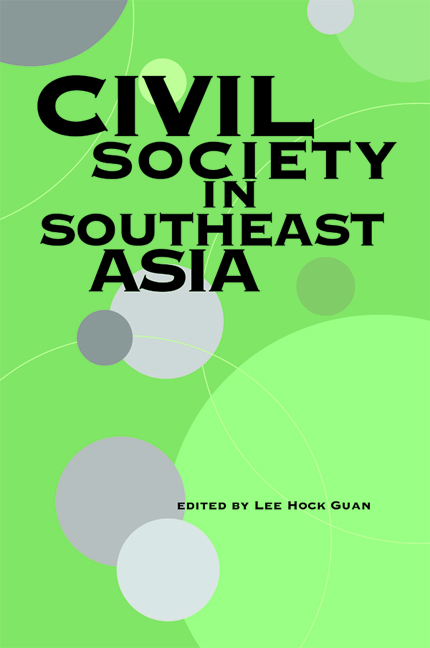Book contents
- Frontmatter
- Contents
- Preface
- About the Contributors
- 1 Introduction: Civil Society in Southeast Asia
- 2 Islam, Constitutional Democracy, and the Islamic State in Malaysia
- 3 Cracks in the Wall of Separation?: The Church, Civil Society, and the State in the Philippines
- 4 New Buddhism, Urban Space, and Virtual Civil Society
- 5 Women's Movement in the Philippines and the Politics of Critical Collaboration with the State
- 6 Participation of the Women's Movement in Malaysia: The 1999 General Election
- 7 Civil Society Effectiveness and the Vietnamese State — Despite or Because of the Lack of Autonomy
- 8 Relationship between State and Civil Society in Singapore: Clarifying the Concepts, Assessing the Ground
- 9 Civil Society in Malaysia: An Arena of Contestations?
- 10 Ethnicity and the Civil Rights Movement in Indonesia
- 11 Civil Society Discourse and the Future of Radical Environmental Movements in Thailand
- Index
4 - New Buddhism, Urban Space, and Virtual Civil Society
Published online by Cambridge University Press: 03 November 2017
- Frontmatter
- Contents
- Preface
- About the Contributors
- 1 Introduction: Civil Society in Southeast Asia
- 2 Islam, Constitutional Democracy, and the Islamic State in Malaysia
- 3 Cracks in the Wall of Separation?: The Church, Civil Society, and the State in the Philippines
- 4 New Buddhism, Urban Space, and Virtual Civil Society
- 5 Women's Movement in the Philippines and the Politics of Critical Collaboration with the State
- 6 Participation of the Women's Movement in Malaysia: The 1999 General Election
- 7 Civil Society Effectiveness and the Vietnamese State — Despite or Because of the Lack of Autonomy
- 8 Relationship between State and Civil Society in Singapore: Clarifying the Concepts, Assessing the Ground
- 9 Civil Society in Malaysia: An Arena of Contestations?
- 10 Ethnicity and the Civil Rights Movement in Indonesia
- 11 Civil Society Discourse and the Future of Radical Environmental Movements in Thailand
- Index
Summary
Welcome to Virtual Sangha [Buddhist monastic order], from your Buddhism Guide at The Mining Company. I hope you will treat this area like you would your own sangha — as a place to learn, to teach, to talk, and to take refuge. No topics are offlimits, and no tradition or school is favored or excluded. We treat each other with respect and reverence, and it is a peaceful place as a result.
<http://buddhism.about.com/religion/buddhism/mpchat.htm> (emphasis mine)
People live in places, power rules through flows
(Castells 1989, p. 349)INTRODUCTION
In a widely talked-about article, Harvard political scientist Robert Putnam (1995) bemoaned the recent decline of associational life in America; though some critics have suggested that this may not be the case if we look at the increasing use and civic potential of the Internet. Howard Rheingold (1993, p. 42), for instance, argues for the “social utopian role” of technologies such as the Internet in generating new virtual communities from the social atomization caused by modernization. Indeed, he suggests that the Internet may even bring about a new sociality or communitarianism to “revitalise the public sphere” (Rheingold 1993, pp. 12, 14).
But the argument that the Internet is creating a meaningful virtual civil society (even if it is seen as disembodied) would depend on its ability to generate social capital (James S. Coleman's term). However, no doubt Putman would see the Internet, along with television, as indicating a decline in social capital; namely those communal networks, norms, and social trust that support an efficient, cohesive society, and facilitate interaction among members. In this line of argument, it is not enough for the Internet (which has a history marked by a strong libertarian ethos) — like other electronic devices such as the telephone or fax machine before it — to encourage the organization of civic groups. Instead, Internet-based associations need to have the same qualities as associations in traditional civil society, with members interacting as if they were in a (real) Buddhist monastery, conference centre, or soccer stadium. In this sense, aside from simply being a technology, cyberspace, then, needs to be considered a place; at least a place out there, somewhere (even outside the state).
- Type
- Chapter
- Information
- Civil Society in Southeast Asia , pp. 78 - 100Publisher: ISEAS–Yusof Ishak InstitutePrint publication year: 2004

